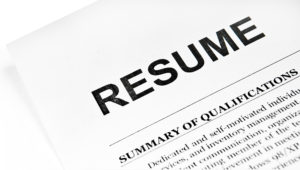Once you’ve completed your culinary arts program, you’ll be a veritable kitchen master, able to saute and mince with the best of them. But do you know how to put together your resume? Nowadays, landing that dream job, be it a chef or an astrophysicist, is more than just what you know, but how you present yourself.
It’s important to craft the perfect document when you’re dealing with an especially competitive workplace. According to a 2010 survey by Career Builder, nearly 50 percent of all employers only look at the first 25 resumes their hiring offices receives. And, as a study by The Ladders revealed, most recruiters spend less than eight seconds on individual resumes.
Want your resume to stand out as much as your signature penne pasta dish? Then consider the following tips:
1. Don’t overdo it: Regardless of the specific industry, many applicants have a tendency to overload their resume with their entire life story and every minute detail of their previous jobs. However, as Chef’s Pro pointed out, you want to try and take a “less is more” approach. So, if you’re applying for a job as a sous chef in an Italian eatery, you don’t need to mention your experience as an office temp. It’s also important to remember how to share information properly. Paragraphs are too bulky and unappealing, which is why bullet points are the preferred choice for most resumes. As an extension, don’t go overboard with references; two to three usually suffice. If you feel like you’ve included too much into a resume, have a friend read it over and make some suggestions.
2. But offer just enough: Yes, you want to try and streamline your resume as much as possible. However, chefs’ resumes still need a certain level of specificity. If you say you worked at Luigi’s Restaurant from May 2014 to June 2015 as a pastry chef, that doesn’t give your new employer a lot to go off. Instead, remembering to be succinct as possible, give them the most important details. What kind of food did you cook? How much supervision did you have? What other tasks did you learn? Were there areas in the kitchen where you may have lacked experience? The more info they have, the better informed the manager’s final decision will be. You want managers to have enough info to be interested, at which point they’ll be more inclined to book interviews.
3. Go beyond the facts: In resume writing, there are hard skills, actual abilities like how many words you can type a minute. Inversely, soft skills are those less tangible abilities, like personality traits. As CookingSchools.com mentioned, it’s important that chefs emphasize those soft skills in their resumes. Specifically, what can you do that goes beyond your ability to chop or stir a pan. What kind of creative insights do you bring into the kitchen? Some restaurants will want chefs who play around with new and exciting dishes. Do you know what else goes into running a kitchen, and can you handle more of these administrative tasks? Do you know how to market your various dishes? Simply knowing how to cook will only get you so far and great chefs master all parts of a true culinary experience.
4. Keep it classy: No matter what job you’re going after, you need to present an air of professionalism. To ensure that, Big Interview suggested avoiding the following mistakes in any resume:
- Silly fonts.
- Bright colors.
- Pictures.
- ALL CAPS WRITING.
- Smiley faces or othr emoticons.
You also need to watch out for white spaces. While some of these are helpful to prevent text blocking, too much white space can prove distracting to the reader. As for acceptable forms of text, Bloomberg pointed out several professional varieties. Going out for a job at a fancy French cafe? Then use the elegant Didot font. Want something a bit more legible and to-the-point? Then Garamond is your best option. Just don’t use fonts like Comic Sans, Zapfino or Courier.




